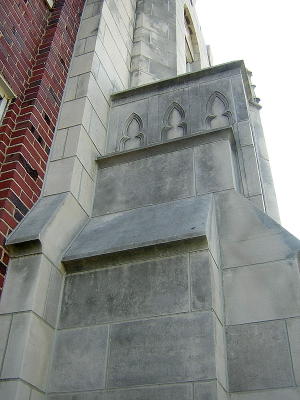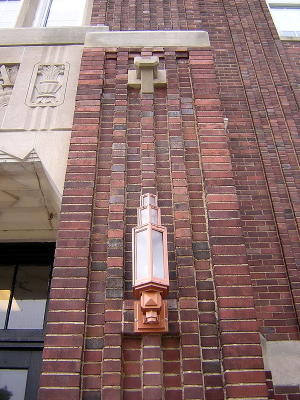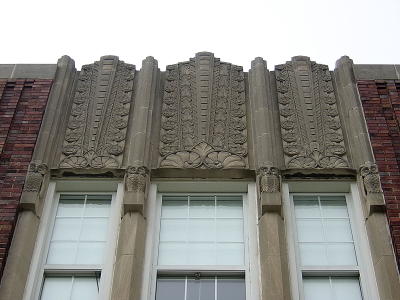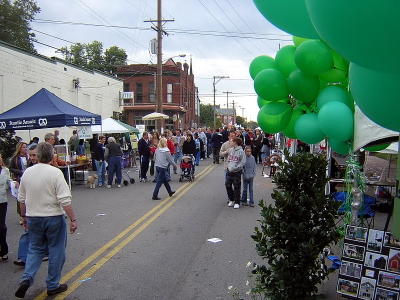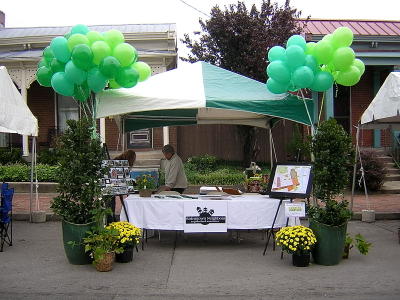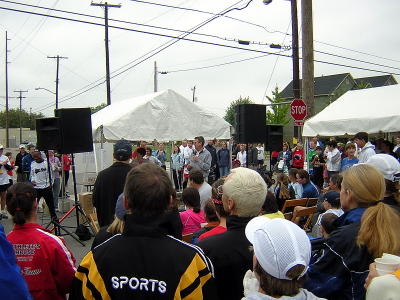Pages
Monday, October 31, 2005
Last Chance To Grab Land Before The South End Starts Booming?
Oh, the boys forever riding in the caboose on the perennially late train that is our Metro Council could come in and muck everything up just for spite at Downtown development, undoing even Council's own recommendation to put a ballpark on the riverfront before the Mayor they love to loath was convinced to support the idea (did they originally support the idea just because the Mayor seemed cool to it?). That slim chance itself might dampen the rockets sending South End real estate prices skyward enough for a few more to invest in some property before the game becomes totally restricted to the high stakes players. But most of us who didn't get into the South End already have missed our chance.
Oh, well. We can always admire the view from the cheap seats.
Transparent TTR Tactics
Politics is no longer merely the brokering of deals between professional politicians in smoke-filled rooms. It is a contentious fight between well-funded special interest groups like TTR. The winners are those who do not necessarily represent the common good of all of Davidson County residents, but those who are able to amass enough signatures on petitions in support of lightning rod issues so to mobilize a critical mass (rather than a representative mass) of people to the polls on election days in fine electoral-majoritarian style (that is, not just a majority of all voters, but a majority of the minority of voters who turn out to vote).
But from where I sit, there are some very real weaknesses to the TTR petition drive that opposing savvy interest groups might want to exploit. First, TTR is encouraging the wide distribution of the petition over their e-mail network without much oversight on how signatures are being collected. They are even encouraging recipients to hit up local businesses to have petitions posted on clipboards on check-out lines. This would seem to open them up to legal challenge and demands to check the legitimacy and validity of every single signature they get.
Second, in its most recent e-mail correspondence, TTR has made a significant change in the deadline for collecting these petitions. The initial group of petitions they made available to their network was dated for the August 3, 2006 elections. Today they contacted members of their network saying that they are changing the date on the petition to November 7, 2006. According to TTR correspondence:
Why are we making the change? In talking with the election commission about all the details of the petition this week, we found that if we submitted the petitions after the August 3, 2006 election far fewer signatures would be required. You are required to submit 10% of the signatures in the last "general county election." The Aug.3 2006 election will have a much lower turnout than the previous county general election in November 2004 and thus we will have to submit far fewer signatures. The only change is that the proposed charter amendment will appear on the November 7, 2006 ballot instead of the August 3, 2006 ballot.So, the political strategists at TTR are astutely playing the odds of general voter apathy (rather than playing up the democratic ideal of encouraging all voters to vote or arguing that we need to stop wasting taxes on poorly attended elections) and lowering their risk of losing. But this strategy is not without its problems that opposing strategists might exploit. According to TTR, the response to the first petition available is "stupendous." I don't know what kind of numbers that translates to, but let's say that it is in the hundreds or the thousands; if those signers of the original petition signed for an August 3, 2006 ballot, it could be argued that they were not signing for a November 7, 2006 ballot, and their signatures might be open to challenge and disqualification.
The TTR strategists cryptically answer:
DON'T WORRY ABOUT re-signing those who have already signed the old petition form, we will take care of that. Just send us all the signatures you have on the old petition form (The one with the August 3, 2006 date) and then start using the new form.The logical counter is, "How are they going to take care of that?" Hopefully, someone is watching them to see exactly how they take care of that. If their methods are unethical, then that leaves them open to legal challenge.
But even if TTR is able to validate all of the older signatures, opponent groups still have recourse. Beat them at their own game. Mobilize voters in large numbers for the August 3, 2006 election to force TTR to get as many signatures as they would have had to get on the old petition. And then mobilize voters to the November 7, 2006 polls, too. It may mean the difference between a representative Metro Nashville government and one merely subject to the cynical whim of TTR strategists.
Sunday, October 30, 2005
Some Measure Of The Mystery Behind The Mystery House Solved
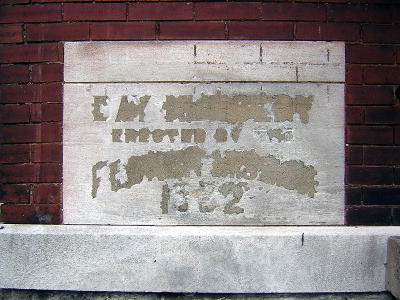
One mystery solved is the name of the group that erected the "Day Nursery." The 1892 deeds registry records that the "Flower Mission" bought two of the lots on which the current building sits. The cornerstone's original message is now clear:
DAY NURSERY
ERECTED BY THE
FLOWER MISSION
1892
to establish, provide for, and maintain day homes in Nashville and Davidson County Tennessee for the care comfort nursing and education of the children of working women. To assist working women by providing for their children and for other charitable work for assisting the poor. And as provided for in the Act of the General Assembly of 1875 ... the support of any benevolent or charitable undertaking as ... hospitals for the sick, houses of refuge or correction, orphan asylums.
The Flower Mission seems to have been a local civic benevolent group dedicated to what professor and activist Robert Fisher calls "social welfare neighborhood organizing," which dominated the early history of American neighborhood organizing (1886-1929).
The Day Nursery seems to have been a part of the settlement house movement of the era, of which Jane Addams's Hull House in Chicago is perhaps most famous. According to Fisher, settlement houses served as "class mediators" between rich and poor in order to promote social order in the face of large immigrant populations and the bad health and social conditions of heavy industrialization in the Gilded Age. Social reformers of the period got involved out of a mixed bag of emotions, including a desire for personal meaning; hence, it is not surprising that the Flower Mission group was made up of women who, according to Fisher, would have been severely limited in professional opportunities.
But what makes the identity of the Flower Mission so intriguing for me is that one of the signers of its charter is Fannie Battle, Confederate spy, school teacher, and social reformer. According to Volunteer State professor, Carole Bucy, Battle got involved in philanthropic work in 1881 when she organized Nashville civic leaders into the Nashville Relief Society to respond to evacuees of one of the major floods of the Cumberland River. Battle next organized United Charities (UC), quit her teaching job, and served as UC Secretary-General for the rest of her life.
Teaching was one of the few professions that women were allowed in the late 19th Century. Influencing the political sphere was even more remote without the vote. It makes sense to me that Fannie Battle, who once experienced the rush and intrigue of being a spy, would leave teaching for the challenge of working in the breach between rich and poor caused by the massive social upheavals of the Gilded Age. To affect the social order progressively by informing the rich about "how the other half lives," and by encouraging the poor by providing services they would not have otherwise must have been a very attractive alternative to ambitious women like Battle.
Bucy does not refer to the Flower Mission or the Day Nursery. 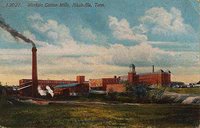 However, she does write that Battle rented a room in a North Nashville neighborhood (Germantown; now Salemtown?) near the Warioto Cotton Mills (now Werthan Lofts) that employed women mill workers and that she established a daycare program.
However, she does write that Battle rented a room in a North Nashville neighborhood (Germantown; now Salemtown?) near the Warioto Cotton Mills (now Werthan Lofts) that employed women mill workers and that she established a daycare program.
The Fannie Battle Day Home is the legacy of that program and it continues in its present location in East Nashville on Shelby Avenue, although their website does not give any indication of a connection between the Shelby Avenue home and the Day Nursery at 10th and Garfield. A mystery remains: was the Flower Mission a link between that first room that Battle rented in Germantown and the current Day Home on Shelby Avenue?
There seems to be some evidence in the Register of Deeds that it was the link. Almost exactly two years after purchasing the property, the records show that the women of the Flower Mission changed their name to "The Day Home For Working Women's Children." I am assuming, without benefit of contrary evidence, that the common name, "Day Home," is the link between the 10th Ave. property and the Shelby Ave. property.
The facility remained the same, according to the records, until 1924 when The Day Home For Working Women's Children "gave" the property to The Junior League of Nashville for the sum of $5.00. At this point, the deeds conflict with John Connelly's book on North Nashville, which seems to report that Freewill Baptists owned the property from 1907. The deeds show that the Junior League turned the property around in 1930, selling it to the Freewill Baptists for $4,000.
Saturday, October 29, 2005
Biosolids Groundbreaking Update
Friday, October 28, 2005
The Real Estate Section Of This Week's Nashville Scene Looks Like A North End Centerfold, Updated
- 5th Avenue Brownstones has been running an ad for several weeks, and it seems to be working as before ground has even been broken developers report that 2 of the 10 townhouses are under contract.
- Garfield Place has a bold green ad occupying a quarter of a page.
- Riverfront Condominiums makes its own splash with an impressive mock-up of how the Bicentennial Mall area complex (the only residential complex in the Downtown area on the river) will look once renovations are complete.
11/06/2005, 9:00 a.m. Update: Less preliminary details on the 6th Avenue development I mentioned at the end of this post are available here.
Why The Numbers 9.9 And 6.4 Are So Obscene To Me
To add insult to injury, look for big oil to blitz the airwaves with blatant "we're-all-in-this-together" PR to try to salve your energy nerves. Now that they've got all those billions of profits, they're going to have to spend them on something flashly to keep you buzzed and "fuelish." God forbid they sacrifice like the rest of us are having to do during this national malaise.
Thursday, October 27, 2005
Baltimore Developer Stays With Downtown Ballpark Plans
The only remaining remarkable obstacle seems to be the Metro Council, which seems now to be bucking even though a few months ago it seemed sure enough to expedite its recommendation that the best use for the riverfront property would be a new ballpark. Given all we've been through with the Council this year, are we surprised by their waffling?
But leave it to Councilmember David Briley to redeem Council nonsense by proposing a great idea for Nashville: a "windfall profits provision" that would allow Nashville to be a secondary beneficiary should the Sounds be sold for a larger profit because of the new ballpark. That would sweeten the take. It's like icing.
Wednesday, October 26, 2005
White Sox Win Series!
In 1917 the Chisox won their last Series, one year after the Bosox did it ... history repeats in 2004 & 2005! But as much as the popular Red Sox Nation deserved the Series win last year, underdog South Side Chicago deserved this year even more.
Is HGTV Tragedy-Pimping?
Well, this week they were in Katrina-ravaged New Orleans to document the damage and destruction to a family's "dream house," which was in the construction process before the hurricane hit. The Lower 9th Ward has not even dried out yet, and HGTV is rushing into the Big Easy to make big bucks off of other people's tragedy, but it's a middle class tragedy; that's pretty much the bulk of HGTV's audience share. The producers are virtual pimps, converting middle-class distress to dollars. We feel their pain and pay for it.
As much as this is tragedy-pimping, it is also evidence of how quickly the national debate on the plight of the American lower class and underclass has all but died. That discussion ramped up right after we saw the pictures of the immediate aftermath, but it didn't seem to survive but a couple of weeks at the most. Rather than dissipating, Katrina has been transformed into entertainment value, which gives it a part of a market share for networks, and makes the audience forget about the displaced and the impoverished. Now we're either focused on something else or training our eyes on middle class families who wonder how they can rebuild their dream home even as many New Orleaneans in the background can't even dream of a home.
Chris Wage, taking a different tack, isn't one to let the debate die. He asks why at this late date FEMA has only spent 1/4 of the congressionally allotted Katrina relief on New Orleans. Good question.
Northeast Nashville To Get Streetscape Grant
There is an article in today's Tennessean about a $1.3 million state enhancement grant for the "Dickerson Road Streetscape Project," which will be used to revitalize Dickerson Pike between Spring and Grace Streets by strengthening "cultural, aesthetic, and environmental aspects."
I met Sam McCullough, Executive Director of North Edgefield Organized Neighbors, at the Mayor's Conference this past Saturday. He was interviewed for the Tennessean piece, given that the development is in his neighborhood. He gave us his own suggestions on Saturday for working through the grant process in light of Salemtown's community block grant (the Tennessean mentions that MDHA was administering a similar block grant in Sam's neighborhood).
It's fantastic to see a substantial amount of federal money going to an area that needs it.
Tuesday, October 25, 2005
Islamic Theocracy Is That For Which We've Wasted Our Money And American Lives? Updated
Islam is the official religion of the state and it is a fundamental source of legislation .... No law that contradicts the established provisions of Islam may be established.So we've now had 2,000 troops killed in action (over 1,300 in the last sixteen months of the war) and spent hundreds of billions of dollars to defend a government and now a constitution that we could not defend in America. And we will be defending the establishment of religion in Iraq for perhaps at least the next decade with no end in sight. Meanwhile, we've got domestic programs about to die or to hemorrhage badly just to pay for a theocracy overseas and tax cuts for the rich.
Purple fingers or not, how did we let our priorities get turned so inside-out?
10/26/2005, 10:30 a.m. Update: Via Bruce Barry at PiTW, a Washington Post map showing the military death toll on a US map. This cannot be confirmed by the Pentagon, which said recently that 2,000 is an arbitrary number that does not matter. Can we say the same thing about the 2004 presidential election results? They are just arbitrary numbers that shouldn't really matter?
Downtown Will Be Soundstown in 2007, Updated
This is welcome news for those of us who are baseball fans and property owners living in or near Downtown, especially those of us who already hold Sounds season tickets. So, play ball!
10/26/2005, 7:45 a.m. Update: The Tennessean reports this morning that there is a catch in the deal; the planned developers have not signed on to it. I can't imagine that the Sounds will have a difficult time getting developers for some prime downtown riverfront property. It sells itself.
The same article quotes Ben Cunningham of the lobbyist group Tennessee Tax Revolt[ing] as criticizing the deal because he says tax breaks should go to develop blighted areas. Over the weekend in a different context, the Tennessean referred to Mr. Cunningham as an "ethics activist." This morning they switched back again to identify him as an anti-tax leader. But since the stadium deal doesn't really involve raising taxes, perhaps the Tennessean's latest label for Mr. Cunningham is a touch out-of-school. If the reporters had been paying attention to Mr. Cunningham's eternal opposition to Metro Nashville administration, they might have played to the progressive advocacy of Nashville's dispossessed that he has donned for this story. Hence, in the context of the stadium story, Mr. Cunningham should be labeled a "blight fighter."
Groundbreaking For Central Wastewater Treatment Campus Slated For November 3
Salemtown Neighbors Members Meet Developers of Salemtown Gardens
 Members of Salemtown Neighbors look over plans for Salemtown Gardens on 6th Ave., North and mingle with the business partners of that new development after last night's October association meeting. Those developers also told the group that the rezoning public hearing had been deferred from October 27 to an undisclosed future date. Enclave will keep you updated once a new date is publicized.
Members of Salemtown Neighbors look over plans for Salemtown Gardens on 6th Ave., North and mingle with the business partners of that new development after last night's October association meeting. Those developers also told the group that the rezoning public hearing had been deferred from October 27 to an undisclosed future date. Enclave will keep you updated once a new date is publicized.
Salemtown Business Leader Quoted In Tennessean Piece About Rosa Parks
Monday, October 24, 2005
Rest In Peace, Ms. Rosa Parks
 When the bus driver threatened to arrest her himself, she continued to refuse to give up her right to a seat in the black section, which forced him to get the Montgomery police to do so, thus, bringing greater publicity that Montgomery city officials would just as soon have avoided. Within a short time, not only did blacks win the right to ride in the black sections of public buses, they won the right to ride in any section of public buses.
When the bus driver threatened to arrest her himself, she continued to refuse to give up her right to a seat in the black section, which forced him to get the Montgomery police to do so, thus, bringing greater publicity that Montgomery city officials would just as soon have avoided. Within a short time, not only did blacks win the right to ride in the black sections of public buses, they won the right to ride in any section of public buses.Several black Montgomerians had preceded Ms. Parks in refusing to give up their bus seats to whites in 1955, but Ms. Parks was chosen as a symbol by the Montgomery movement--much like the Brooklyn Dodgers chose Jackie Robinson--as someone whose impeccable character could withstand harsh controversy, which would ensue with the Montgomery bus boycott. Taylor Branch said of Ms. Parks:
She wore rimless spectacles, spoke quietly, wrote and typed faultless letters on her own, and had never been known to lower herself to factionalism. A tireless worker and churchgoer, of working-class station and middle-class demeanor, Rosa Parks was one of those rare people of whom everyone agreed that she gave more than she got. Her character represented one of the isolated high blips on the graph of human nature, offsetting a dozen or so sociopaths. [Parting the Waters, pp. 125].Rosa Parks has always been a personal inspiration for my own political identity and a historical inspiration for neighborhood organizers everywhere. Thank you, Ms. Rosa Parks.
Giving Credit Where It's Due, Updated
The entire crowd attending Chief Serpas's keynote at the Mayor's Conference on Saturday came away unscathed. No lightning struck. In fact, the presentation was a bit dry. That was perhaps due to the possibility that Chief Serpas was upstaged by Mayor Purcell's sermon-like depth-charge announcement not to seek a third term. Or is could have been as fellow blogger John H. whispered to me during Serpas' talk: showing multiple PowerPoint slides of multi-celled tables with a tidal wave of data instead of simple bullets is not crowd-friendly.
But I did take two significant stats away from the presentation that should mitigate a lot of the recent hooey we hear lately from those who whine about being more prone now to speeding tickets because of Serpas's aggressive traffic policies. According to the Chief, 22% (50,000) of all the traffic stops made under Serpas lead to a warning, not a citation. In a city where I've heard people complain about how bad "Tennessee drivers" are, that seems relatively generous leeway. (Of course, that stat doesn't tell us how many of those warnings issued occurred as the result of attractive women drivers who claim--like one of my neighbors has--"to talk their way out" of a ticket by being flirtatious with cops).
But the second stat was even more impressive to me: 13% (30,000) of all traffic stops made during his tenure have lead to arrests for more significant crimes committed. Now, the ends don't justify means when the means are too unbearable or unfair. But pulling speeders and other minor traffic violators over as a means of making more significant arrests is not an undue burden; especially, for those of us who live in the city and expect our patrol officers to make routine traffic stops to discourage the riff-raff, who usually come from outside the neighborhoods.
One of my otherwise lawful neighbors was pulled over in Salemtown recently he claims because of his rumbling muscle car, but having left his license at home, he was given a citation. However, the Central Precinct reports that several arrests have been made in Salemtown during such routine traffic stops. It is unfortunate when otherwise good people get cited for traffic violations, but if you drive a car you must accept the risks that come with it; and those risks increase when you violate even the most trivial traffic laws. For some to argue that we should forestall the possibility of nabbing and incarcerating suspects with serious criminal histories just so that minor violators can enjoy their entitlements to minor violations is just plain silly.
My neighbor accepted his ticket gracefully; there are others who act like spoiled brats. I have very little sympathy for those who grouse and beef about police at traffic stops (disclaimer in light of Blake Wylie's comment below: while Blake has bellyached about traffic stops in the past, he himself has never received a traffic citation and should not be confused with those who have received or will receive past or future traffic citations). Here's why my sympathies fail:
- Whiners need to be cautious about their bellyaching lest they come across as anti-police-protection.
- If the "Debby Downers" are so concerned about robberies, then they need to take action and work with the police when suspicious activity is occurring. Those of us who actually live in the city to which weekend revellers come to party understand that crime can be very real on these streets. We also understand that we have a Police Chief who places a premium on stats. So, what do we do? We watch our neighborhoods and report anything suspicious that we see. Increasing the number of our reports increases patrols. If we don't see increased patrols, we work with our precinct officers to get more. If you think certain areas you patronize need more patrols, get off your patioed ass and out from behind your top-shelf Marguerita and do something about it.
- Finally, the bitchers need to realize, as Chief Serpas reported on Saturday, that robberies are trending up in cities across the country. That doesn't excuse our local police from protecting us, but I would bet the national trend is not the result of every other police chief having an aggressive traffic stop policy.
10/24/2005, Noon Update: I have added a qualification about Blake Wylie's "grousing and beefing" in light of his comment below. But that disclaimer does not change the validity of my argument about those who complain about traffic stops, whether the complainers actually received tickets or not. Those who complain but don't receive traffic tickets should not minimize the traffic violations of others and should not impugn traffic stops by crying for less stops and more patrols while the rest of us are actually doing things to increase patrols.
Sunday, October 23, 2005
Fertility And Facilities: Exploding Evangelical Smugness And Disrobing The Theological Myth Of Mainline Decline
This new study indicates that the real causes of mainline decline and conservative growth are more simply explained: sex and retention more than theology controls church size. Decline in the birthrates caused by family-planning practices now dominant in American culture were accepted earlier in the twentieth century among women who attended mainline churches than their counterparts in conservative churches. However, current fertility rates between evangelicals and mainliners are virtually the same.
The study indicates that conservatives were more successful than mainline churches in retaining their members. My own view of retention differences is that conservatives are better than mainliners at building mega-church "Christian Life Centers" with comprehensive recreation and entertainment facilities, which are strong attractors, especially when they are conveniently located in suburbs. Large building facilities may point to real amenity differences, but they don't suggest theological differences as attractors.
Fertility and facilities have been the principle causes of evangelical church growth over the last one hundred years. But even that is changing as evangelical fertility is now declining at a mainline rate and as diminishing numbers of mainliners are making the jump to conservative churches. Pay no heed to grand narratives about theological differences. Watch for shrinkage in conservative churches now that evangelical families are getting smaller. It will be fun to watch the myths change to suit.
Saturday, October 22, 2005
A Very Humbling And Proud Moment
 Thanks to the Police Officers of the Central Precinct and the Mayor's Office, I was the recipient this afternoon of the "Neighbor of the Year" Award for the Central Precinct (which includes the downtown neighborhoods inside the I-40/I-65 loop). This award came as a total surprise to me.
Thanks to the Police Officers of the Central Precinct and the Mayor's Office, I was the recipient this afternoon of the "Neighbor of the Year" Award for the Central Precinct (which includes the downtown neighborhoods inside the I-40/I-65 loop). This award came as a total surprise to me.Nonetheless, I should mention that "Salemtown Neighbors" is also engraved prominently on the award plaque (as you can see below), which is appropriate since so much of my effort and any claim I have to progress in the North End relies on the support and cooperation of the other members of our association.
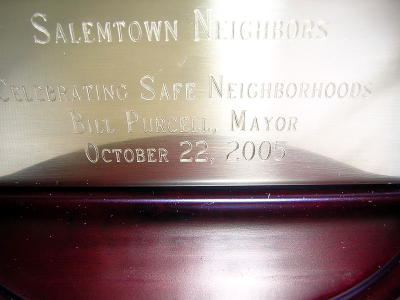
Mayor's Office Confirms That Bill Purcell Will Not Pursue A Third Term
-----Original Message-----Okay, I was really irritable and mean when I criticized the Mayor for introducing his budget to the exclusive Chamber of Commerce audience a few months ago. I feel better now that at least he saved his bigger proposal of a Charter overhaul for the neighborhood groups at a free lunch. Bygones.
FOR IMMEDIATE RELEASE
October 22, 2005
Purcell says "No third term"
Mayor Bill Purcell today said he will not seek a third term and called for Metro Charter revisions to limit mayors to two terms, reduce the size of the Metro Council and create an independent Metro auditor. Purcell announced his plans at the Mayor's Office of Neighborhoods 5th Annual Celebrating Neighborhoods Conference before 200 neighborhood and community leaders. He established the Mayor's Office of Neighborhoods in his first official act as mayor when he took office on September 21, 1999." I believe that in the next two years we will complete all the things that we set out to do when I took office six years ago," Purcell said. "We will have built the school rooms we need to provide a quality education to our students. We will have a police force that is fully staffed and visible and touches every part of our city. We will provide a quality of life to every neighborhood in Nashville through our parks and sidewalks, greenways and bikeways." Purcell said based on his experience and the precedent of other elected offices, he believes two terms should be the limit for mayors. He said he will ask the Charter Revision Commission to "clean up" the Metro Charter and limit the number of terms for a mayor from three to two, the same limit put in place for the Metro Council in 1994. He said he will also ask the commission to look at two other amendments. Purcell said it is time to consider reducing the size of the 40 member Metro Council, which is currently the second largest in the nation. He also wants to establish an independent auditor for Metro under the Charter. "Today, Nashville is recognized nationally for its accomplishments in, economic development, focus on education, and quality of life," Purcell said. "The foundation we have established for neighborhoods is set and serves as a model to other cities. Together we have accomplished a great deal and we will finish the job by staying focused over the next two years."
Indecent Exposure
The pictures you see here are of a hunter green Chevrolet Yukon stopping just off of Hume around 4:30 today so that the African American driver can relieve himself when there are perfectly good gas station urinals just a few blocks away. He also littered before he left.
The first pic was taken in mid-piss. The second one as the driver backs out of the alley upon seeing me appear with my camera. The third one as he speeds away; tried to get a clear shot of the license plate, but it didn't turn out well.



Neighborhood Conference Today
The reporters also quote Ben Cunningham, who was previously an anti-revenue lobbyist with Tennessee Tax Revolt. Just out of curiousity, how does one move from being an anti-revenue lobbyist to becoming an "ethics activist"? Is it is simple as the shift from one political hot potato du jour to the next? Shall we call it "niche stalking"?
Friday, October 21, 2005
Jeff Street J.U.M.P.S. Into Paper's Spotlight
Thursday, October 20, 2005
The Social Construction of Rurality II
Worth a read.
Farmers Market Face Lift?
Here's a morsel to add to the information mix: Mark Kerske of Gardens of Babylon is said to be vying for space for a health and holistic foods market and cafe at Farmers Market.
On a related note: the Farmers Market Harvest Festival is this Saturday afternoon. According to organizers it includes bluegrass music, a pumpkin painting center, food and crafts gallery, cooking, pumpkin carving, decorating workshops, and an apple dessert bake-off contest.
Wednesday, October 19, 2005
Support This 6th Avenue Zoning Change Request
As I have said before, MUN is the more restrictive zoning that requires that buildings come up to the sidewalk and that all parking be in back off of the alley. As such, it is more consistent with the urban and pedestrian character of the North End neighborhoods. It's great to see owners and developers pursuing more restrictive rather than less restrictive zoning. If you dropped by the Salemtown Neighbors booth at Oktoberfest, then you probably saw the attractive preliminary drawings for this development, which is to be called "Salemtown Gardens." So, I think this zoning change request is worthy of support. Residents need to encourage these kinds of new builds.
The public hearing before the Planning Commission is scheduled for Thursday, October 27, 2005 at 4:00 p.m. in the Howard Office Building Auditorium on 700 2nd Ave., South. The Metro Council makes the final decision to approve or disapprove this request based on Commission recommendations.
Will Java Ever Have A North Face Beyond Kijiji?
- I had a chance to chat this morning with Bob Bernstein a bit while I was waiting to pick up a latte and he was waiting for his breakfast over at Bongo East. I asked him again what the chances are of him starting a coffee place on the North End. He told me that he had been approached by folks in Germantown about it, but that there was not much brewing, because real estate prices in Germantown are skyrocketing. Most of the discussion of a coffee place going in at Morgan Park Place seems to be coming more from developers end. It's also not clear that one will be going in at Werthan. I mentioned, as I have in the past, the possibility of grabbing a warehouse over in East Germantown. Bob told me that he is now interested in more than just a storage facility for the coffee if he can find a good arrangement to start a shop. That gave me a chance to mention Salemtown to him. I told him that Salemtown's real estate prices are still lower than Germantown's, although they are probably shooting up at a faster rate than Germantown's ever have. He asked me, "Where is Salemtown?"
- On a side note, Bob confirmed news that I had previously heard that Portland Brews is going to open a shop on the East End.
- On another side note, Bob and his wife are expecting a baby! A new heir to the empire, no doubt.
Tuesday, October 18, 2005
I Can't Believe This Guy Is My Councilman
When I continue to read Ludye Wallace's silly statements in the press justifying the irresponsible actions of our Metro Council, my only response is one similar to Lovitz's. I can't believe that Ludye is my councilman. I can't believe that this is our Council.
Ludye's latest asinine aphorism--covered by the Tennessean and Salem's Lots--is: "If it took a couple of years to put together, it might take us a couple years. You see how we operate in the city council." I interpret that to mean: "Despite shameful government ethics problems from Nashville to Washington, integrity in public service is not an urgent or pressing matter and the Metro Council is going to take its own sweet time to mix in the necessary amount of water to dilute standards that might otherwise restore the public trust in our elected officials. That's just how we are. Deal with it."
I won't be watching Council tonight. I cannot stomach the vacuum of leadership and integrity on this issue; and I don't care to listen to Council members like Ronnie Greer whine that adhering to standards is just too hard. Somebody else will just have to tell me what happens.
Monday, October 17, 2005
Where is Salemtown?
Ready For The Next Round Of Reverberating Katrina Body Blows? This Week They're Coming From Congressional Republicans.
This is simply a matter of taking from programs that support the more vulnerable in society and our local communities to give to New Orleans because Congress failed a long time ago to front the money to make the Big Easy's levees safer. So, Republicans are now making up by taking revenues from local communities to give to a single local community, while cutting the taxes of the rich.
If you thought higher gas and utility prices were the only cascading effects of Katrina, just wait until the Republican habit of raising revenues for the rich and sticking it to everybody else gets rolling. Their brightest idea in Katrina's aftermath seems to be to divide and conquer.
Spring Hill Has Become Dystopia
That's produced a real quandary down in suburbia. Wouldn't it be interesting if the Aldermen passed an exception for non-commercial construction? Is it really biblical to require commercial construction to rest on Sunday, but to allow families to toil on construction projects on their homes to heart's content? More importantly, is it legal? I smell grounds for a lawsuit.
Either way, it looks like there is a totally different price to pay in Dystopia in exchange for owing no property taxes.
Nomination
I don't know who made that nomination, but I would like to extend my thoroughly surprised gratitude here if that party happens to read Enclave.
Sunday, October 16, 2005
World Series Is Returning To Sweet Home Chicago!
As for the "Los Angeles Angels of Anaheim": now, there's a floating signifier.
The Social Construction Of Rurality
It seems that south of Atlanta, folks are trying to fight spreading "urban sprawl" (a.k.a., suburbia, which itself has never had much meaning to convey anyway) by buying up land and building what they consider small rural townships. But these townships are not the Mayberrys or Pixleys popularized in the more pastoral television reruns; they only exhibit loose and detached agrarian molds.
Rather than residents being separated by great distances, but held together by county seats or small town squares, these new ruralities exhibit the density of classic urban neighborhoods even as they are "tucked into a wide expanse of woodland, meadows and fields, laced with trails." These new "hamlets" do not seem driven by classical agricultural economic models; instead, the Times piece indicates that the economy is almost exclusively service-based. The article also suggests that the ruralities serve primarily as weekend retreats for some of Atlanta's city dwellers. One such retreater told the Times that he enjoys "the whole idea of living on a farm without having to do farm work." Farm life has indeed become a floating signifier giving ruralities an escapist and an environmentalist meaning.
I finished the article wondering whether these small townships are actually just the next wave of sprawl; a kind of sprawl-against-sprawl; the next outermost concentric wave of development caused by the splashes of suburbia and exurbia and the logical extension of the metropolitan idea.
Gardens Gets Landscaping Contracts, Including Morgan Park Place
This is great news and very well deserved. Congrats to our friends at Gardens of Babylon!
Further Evidence That That The Majority Of Metro Council Members Does Not Care A Lick About Integrity
Where the hell were Charlie Tygard and Ronnie Greer, both of whom have delayed and resisted ethics reform in Council loud and long?! Where the hell was Mr. No-Tax-Pledge Jim Gotto?! Couldn't Michael Craddock pull himself away from his Old-Buildings-Suck Protest long enough to get more information on the ethics bill?! Where the hell was my own Councilmember Ludye Wallace?!
This is just another example of how there are only a few Council members who are worth their salt this year--Jameson, Briley, Hausser immediately come to mind. A goodly number of the rest seem to be just taking up space meant for more qualified public servants.
Saturday, October 15, 2005
A Couple Of Traces Of Baseball In Late 19th Century Nashville
From Monday, July 18 edition:
I found no evidence that the Red Stocking Club ever got a response, but, according to the Monday, September 5 edition, a couple of other teams saw some action in North Nashville:Baseball.
The members of the Nashville Red Stocking Baseball Club challenge any baseball organization in the State to play a match game of baseball, at a time and place to be designated by the captains of the respective clubs.
Besides sensing the sheer poignancy of baseball's longevity in Nashville, I was impressed that the baseball score in the latter paragraph was more like a football score and that the ump was "celebrated."Base Ball.
Friday afternoon the A. K. Wards and Rock City clubs crossed lances on Sulphur Spring bottom [near what is today 4th and 5th Avenues and Jackson St.], in a game of base ball. Over two thousand persons witnessed the spirited contest, Mr. Enoch Phillips acting as umpire, with that masterly skill for which he is celebrated. As an evidence of the sharp play we refer to the score, which was as follows: A. K. Wards, 26; Rock Citys, 24.
The Strangest Dog Act I've Ever Witnessed
 I promise not to make a habit of filling this blog with inane anecdotes about my dog, Dix; but I am totally flabbergasted by some odd behavior, and I wanted to share just in case some canine whisperer out there might have insight to share.
I promise not to make a habit of filling this blog with inane anecdotes about my dog, Dix; but I am totally flabbergasted by some odd behavior, and I wanted to share just in case some canine whisperer out there might have insight to share.We were in the backyard breaking in some new dog toys and all of the sudden she got that "got-to-take-a-dump" look and started circling and sniffing for a place to squat. That's not the strange part, because she regularly needs to go. I was proud of her because she stopped circling for a second, looked at me sitting in my deck chair for a cue, which came back to her as, "Dix! Potty!," while pointing toward a back fence corner, which is where we are training her to deposit her little care packages for maggots.
She high-tailed it fleet-footed back to her customary dumping ground and did her business. I was so proud that I did not for once have to lead her back that I decided to feed her a dog treat, which she gets sometimes when she trains well. When she saw me get the treat, she flew back across the yard to me and took it. Still not the strange part.
She laid down like she was going to commence to crunching it. But all of the sudden, she hopped up, treat in mouth, wheeled toward a tree and started digging a small hole between two biceps-shaped roots. When I scolded her about the hole, she dropped the bone-shaped treat in the cavity and started raking leaves and dirt over it with her muzzle. That was the strange part to me. While I've seen dogs bury bones, I've never seen them bury dog food (which will more than likely end up as squirrel food by morning).
Friday, October 14, 2005
Should The Rights To Styles of Historic Neighborhood Signs Be Reserved?
North End “Historic” Sign →
Perhaps some neighborhoods should find other forms of flattery besides imitation when it comes to those decorative neighborhood signs that are popping up around various city thoroughfares. The very attractive neighborhood signs scattered about the Historic East End has been copied in at least one other neighborhood on the North End. Actually, there is only one sign on the North End that is the identical match of the artistic East End signs: it is standing on the corner of 10th Ave. and Garfield and it reads "Historic Buena Vista School" on one side and "10th Avenue North" on the other side.
One of the things we discussed (at a very preliminary level) at the CAC meeting this past Tuesday was the possibility of funding decorative neighborhood signs as other neighborhoods like the East End and Edgefield have. When I pointed out that another North End neighborhood seems to have copied the East End, the community planner told the group that the single North End sign was controversial because the person (artist?) who created the East End signs has reserved rights on them.
Now I can understand a trademark for a title like "Historic East End" that goes on the signs, but I have some question as to whether the style and materials of the East End signs are themselves trademarked. There is no trademark notice on the East End signs. I can find no evidence of a sign trademark on the Historic East End website. Besides, trademarking a style of sign would be sort of like reserving rights to a wrought iron fence or the gothic cut of pickets in a stockade fence, would it not? If someone connected with Historic Buena Vista school was able to have a sign created by professionals that looks almost exactly like the East End signs, wouldn't it stand to reason that such a sign was available on the open market?
Copying the style of East End's signs may be bad form, but is it really illegal?
"You Have To Change The Wind"
Last night over at Vanderbilt, I joined a standing room only crowd to hear Jim Wallis once again criticizing both the political right and left in this country for getting both democracy and faith all wrong. Wallis told the group that Christians--along with other people of faith and like-minded people of no faith--should not simply work together on changing the election of government officials who merely stick their fingers up to see which way political wind is blowing. Instead, he said, "You have to change the wind." Wallis called upon the group to focus more on building a social movement--already begun in the wake of the 2004 election, the Iraq War, and Katrina's aftermath--in which faith has a place for political expression, but in which faith also disciplines itself with democracy and inclusion.
He contrasted that more chastened role of faith in politics to the political rightwing, which he claims created and mobilized the religious rightwing to gain control of our government. Wallis told his audience that religious rightwingers have it wrong as they attempt to portray Jesus as "pro-rich, pro-war, and pro-America." He also contrasted a chastened faith to the political leftwing, which he claims does not create any place for people of faith, not even progressive people of faith. He told a story of how a young gay man told him at one book-signing that it was easier for him to come out of the closet as a homosexual in America than it was for him to come out as a person of faith in the Democratic Party.
Wallis told his audience that he is unapologetically evangelical and unapologetically progressive, and that people in this new growing social movement need to be as unpredictable to both the press and the partisan politicians. There is much more common ground, for instance, on the seemingly divisive issues of abortion and gay marriage among evangelicals and progressives than partisan groups allow, according to Wallis.
Almost a quarter of a century after I first read Wallis's Sojourners magazine, I can see that he is still standing up to both sides of the political spectrum from a uniquely Christian perspective that remains attractive to many Christians and non-Christians alike.
Wednesday, October 12, 2005
Good Riddance, John Henry Hale. You'll Hardly Be Missed.
Thank goodness for Hope VI. It's going to lead to the revitalization of the Marathon Village neighborhood. It's a shame that the Bush Administration and the Republican-controlled Congress have slashed Hope VI to the point that this development is probably going to be the last we see for some time here in Nashville. There are several other housing projects that still need to be demolished around the city to make way for single family homes and duplexes and to provide opportunities for a better life free of crime and trash for neighbors of all income levels.
Tuesday, October 11, 2005
October Salemtown Citizen Advisory Committee Meeting Highlights
MDHA planner Linda Howard showed a PowerPoint presentation with examples of various projects on which CACs from other neighborhoods chose to spend their block grants. That was followed by small group discussions on what members saw as the strengths and weaknesses of Salemtown.
Looks like we will be getting down to brass tacks at the November 8 meeting, when we will be discussing ideas for community projects that could be funded.
The Mystery House At 10th Ave. & Garfield

We stopped at the corner of 10th & Garfield near the spot where I-65 crops 10th, because I noticed a large comely building, which looked to be one of the more historic structures in the neighborhood.
 I was struck by two things. On one side of the building stands a metal tower with a rusting old school or church bell.
I was struck by two things. On one side of the building stands a metal tower with a rusting old school or church bell.DAY NURSERY
ERECTED BY THE
[unreadable word] MISSION
1882
I welcome anyone else's interpretation of the whole 1882 message of the stone.
This is what I do know about the building: it currently houses Christ Temple North. I stopped and spoke with some of the parishioners on Sunday after their service. The ones I talked to were not sure how the cornerstone ended up as it did nor what exactly it read. They also told me that the bell pre-dates their congregation and that they do not use it. They also told me that Cofer's Chapel (a Freewill Baptist congregation currently located on Franklin Road) occupied the building before they did.
That last fact is confirmed in John Connelly's book on North Nashville. Connelly reports that Cofer's Chapel moved, after 45 years in the Buena Vista location, to King's Lane and Clarksville Highway in 1952 (which would have made them the occupants since 1907). Connelly also writes that one of the reasons that Cofer's Chapel moved was that the building had not been designed to be a church. Before 1907 it had been "Polk Avenue Day Home," one of Nashville's first homes for children of working mothers (Connelly, p. 154).
I'd like to track down some information that would solve the mystery of the unnamed owners of the Day Nursery, and how that institution served the neighborhood in its day. I went to the Nashville Room in the main library yesterday to look for information on it, but even with the help of the librarian, we could not find anything on "Polk Avenue Day Home," and very little on Cofer's Chapel before its move to Franklin Road. I'm going to have to dig through some turn-of-the-century newsprint and hope I get lucky.
Sunday, October 09, 2005
One Of The Warts On The History Of North Nashville
 As I mentioned before, I recently read John L. Connelly's book, "North Nashville and Germantown." It is an adequate source for getting some historical background of the German and Swiss communities who lived, worked, and built the North End for a few decades before and after the beginning of the 20th Century.
As I mentioned before, I recently read John L. Connelly's book, "North Nashville and Germantown." It is an adequate source for getting some historical background of the German and Swiss communities who lived, worked, and built the North End for a few decades before and after the beginning of the 20th Century.It has its limitations. It is more like a scrapbook for the older aristocratic families than it is a strongly historical treatment of the North End. That makes some sense, given the date of its publication: 1982, just after Oktoberfest and Germantown's gentrification got off the ground and just after old North High School closed. As such, Connelly's book is more of a nostalgic memorial than it is a critical look at Germantown or "Butchertown" (as it was more popularly known one hundred years ago), which encompassed many more blocks north and west of the current Historic Germantown neighborhood. There are whole chapters where Connelly literally cuts and pastes newspaper clippings of community events rather than re-writing them into a narrative.
Perhaps its greatest limitation for me, a resident living in what was once the heart of the old Butchertown, is Connelly's blind eye to the issues of race. Aside from a handful of references, Connelly basically ignores racial currents even as he underscores the strong Euro-ethnic identity of Butchertown and its erosion by two World Wars against Germany and by the advent of suburbanization and white flight. (Connelly also glosses over class dynamics in North Nashville, but that's a subject for another post).
But the one time that Connelly does engage racial tensions in North Nashville, his account conveys, even if inductively, an atrocious picture of the locals about whom Connelly generally waxes nostalgic. It is what I consider one of the warts on the Germantown heritage.
 According to Connelly--again mostly lifting the account from a Nashville Banner article of the time--in 1923 St. Cecilia Academy (which was originally located in North Nashville; the building still stands and is pictured here) proposed to move elsewhere and sell the property to a "local Negro theological seminary." The Banner piece quoted by Connelly stated that 150 property owners in North Nashville held a mass-meeting at St. Cecilia to discourage the sale. Organizers of that meeting, according to the Banner,
According to Connelly--again mostly lifting the account from a Nashville Banner article of the time--in 1923 St. Cecilia Academy (which was originally located in North Nashville; the building still stands and is pictured here) proposed to move elsewhere and sell the property to a "local Negro theological seminary." The Banner piece quoted by Connelly stated that 150 property owners in North Nashville held a mass-meeting at St. Cecilia to discourage the sale. Organizers of that meeting, according to the Banner,described North Nashville as a high class residential section and expressed the cooperation of the North Nashville Improvement Association to the authorities of St. Cecilia in any movement looking to the prevention of the sale of this property to any parties not considered desirable to the citizens of that community. [p. 151]Connelly says very little about this event and only places it within the post-World War I context of the German community in decline. In my opinion, within such a context and without clarification, his relation of the prevention of the sale of St. Cecilia's to black leadership could reasonably be interpreted as sympathetic to the racial prejudices of the early twentieth century Germantown residents.
It remains unclear to me why Connelly, himself a long-time Germantown resident, was uncritical or unreflective of this event. He could have used this account as a jumping-off point to discuss the historic shifts in the racial make-up of the Germantown area, but he dropped the ball. His omission is glaring. Perhaps he did not want to upset the elderly children of the earlier Germantown residents; that later generation, most of whose members had forsaken Germantown for the suburbs, re-visited the neighborhood in the early 1980's during Oktoberfest. If that was his reason, it is no less troubling than if he believes that turning back the sale of St. Cecilia's due to nothing but the buyer's skin color was justified. It troubles me, because the greater service to these neighborhoods is to provide an unflinching presentation of what has occurred to all those connected in someway to North Nashville, across ethnic divides, past, present, and future.
Moreover, while there is nothing else in Connelly's book that would lead one to the conclusion that there is more ugliness in our community's history, we are able to read between his lines. We do have a history of racial tensions in the south and in Nashville, so we should expect that the 1923 St. Cecilia's fiasco was symbolic, if nothing else, of other shameful events in North Nashville to be left to others to excavate.
Those of us who currently inhabit the North End live in a more diverse and open community than those who were here in 1923 or in 1982. We are less bound either to ethnic/tribal identity or to a communitarian sense of nostalgia that exaggerates beauty at the expense of the truth of warts. So, we are relatively more free than our forbearers were both to see the North End factually and to see it warts and all.
Saturday, October 08, 2005
Friday, October 07, 2005
Oktoberfest Rockin' Eve

I lived in Louisville before moving to Nashville back in the late '80s. One of the annual rituals before the first Saturday in May (otherwise known as the day of the Kentucky Derby) in Louisville was the Kentucky Derby Festival, which was celebrated the two weeks preceding the Derby, and included parades, fireworks, and general revelries. Among my favorite parts of the celebration were the Derby Parties thrown by Louisvillians in their own homes either the Friday night or Saturday morning/afternoon before the Derby post time around 5:00 or 6:00. I especially liked the Saturday parties where everyone would sip on mint juleps and watch and wager amongst themselves on each of the races (broadcast on local TV) that preceded the Derby. I like the idea of pre-parties.
I don't expect even a week-long party to precede Oktoberfest; after all, the Kentucky Derby has been called "the most exciting two minutes in sports," while Oktoberfest is merely a polka-punctuated, beer-saturated, brat-logged celebration of a part of the heritage of North Nashville. But it would be great to start having pre-parties the night before Oktoberfest. I think I'll talk to S-townwife about planning a Friday night pre-party for the 2006 edition of Oktoberfest. Maybe have a backyard soiree or even a poker party. It could become an annual Salemtown tradition.
$200K Grant And Metro Matching Funds Reserved For Riverfront Redevelopment From MetroCenter To Rolling Mill Hill
The Civic Design Center told me that the meeting will run from 11:30 to 1:00. That's not exactly a convenient time to meet for area residents with day jobs, unless they happen to work downtown and brown bag their lunch. I hope that the committee is serious about getting public imput, rather than just going through the motions.
Thursday, October 06, 2005
Congrats To The Fisk Jubilee Singers
 Today is a big day for Fisk University as at 10:00 this morning it commemorates the 134th anniversary of the first tour of the Fisk Jubilee Singers. That tour helped lead to the purchase of Jubilee Hall, one of Nashville's most attractive enduring historic buildings, which graces the northwest neighborhoods skyline.
Today is a big day for Fisk University as at 10:00 this morning it commemorates the 134th anniversary of the first tour of the Fisk Jubilee Singers. That tour helped lead to the purchase of Jubilee Hall, one of Nashville's most attractive enduring historic buildings, which graces the northwest neighborhoods skyline.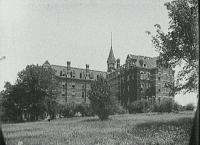 Kudos to the singers, one of America's greatest musical groups, who also helped popularize many of the old slave spirituals that would probably have otherwise been forgotten.
Kudos to the singers, one of America's greatest musical groups, who also helped popularize many of the old slave spirituals that would probably have otherwise been forgotten.However, the Jubilee Singers may not want to make too much of their long-running success as an all-black singing group, lest Knoxville's Republican state representative Stacey Campfield shift his obsession with membership in the Black Legislative Caucus in order to badger, hound, and heckle the singers in a bid to join their group, too.
Probable And Possible Renovations To Morgan Park Community Center
 I spoke with Michael Smith, Manager of the community center at Morgan Park this week about the $200,000 of renovations planned around the park. He told me that there are two other community centers currently being renovated and that MPCC's probably won't start until those are finished. Probable and possible renovations that he mentioned include:
I spoke with Michael Smith, Manager of the community center at Morgan Park this week about the $200,000 of renovations planned around the park. He told me that there are two other community centers currently being renovated and that MPCC's probably won't start until those are finished. Probable and possible renovations that he mentioned include:- Re-surfacing the ball diamond with an all-purpose athletic surface
- Re-flooring the community center
- Bringing the center up to ADA standards, including making the front door, water fountains and restrooms accessible
- Air conditioning the gym and other rooms in the center currently lacking AC
- Possibly adding a room to and renovating the historic house attached to the center
Wednesday, October 05, 2005
Metro Council Passes Resolution To Study Broadband Innovations
I was amazed that the dissent to the resolution was hair-triggered, with dissenting council members not seeming to understand the difference between voting for a "study/report on" the feasibility of establishing a broadband network and voting for establishing a broadband network.A resolution establishing a Task Force on Telecommunications Innovation to explore and report on the feasibility of using Metropolitan Government resources in a network that is available to the public using broadband technologies, broadband over power lines, Wi-Fi, Wi-Max, and other wireless applications, end-user fiber build out, and other telecommunications technologies.
Council member Carolyn Baldwin Tucker basically deconstructed her own dissent by saying that she went online (would that be using nashville.gov's client-server application?) to do some research on the matter. Council member Jamie Isabel extended the confusion--of doing a study vs. establishment of a network--by arguing in dissent that public schools will have a $40 million shortfall next year and that municipal broadband would cost upwards of $40 million, so appointing a task force to explore the possibilities and limitations of a broadband network would be taking money away from our children.
But my favorite dissenting opinion came from Council member Jim Gotto, who said that he had done some research on a couple of towns in Iowa who had bad experiences installing municipal broadband. One of those towns was Muscatine, which had to sell off its broadband network after starting it at a net loss, according to Mr. Gotto. Apparently, his research was not exhaustive enough to include the exact pronunciation of the Iowan town, as he haphazardly gave the council two possible pronunciations based on his own admitted ignorance of the precise pronunciation: "Muscatahne" and "Muscateen." He also failed to mention that Muscatine--the self-proclaimed "pearl button capitol" and the producer of something called "corn wet milling"--has only 23,000 residents, making it hardly worth comparing to cities of Nashville's size.
Thankfully, the knee-jerk dissent did not prevail last night, and we will have a study of broadband possibilities.
I Hate Comcast
I will be posting to Enclave whenever I can, but I am basically beholden to a corporation whom I pay a lot of money, but who can offer me nothing more than the option of waiting for four hour periods to come figure out what the problem is and try to fix it. They'll also probably send out some sub-contractor loosely connected to the company who may screw up more than he might fix. It's happened before. And then I have to call them and let them know exactly how long I have lacked internet service so that they can credit my account. Once again, there's got to be a better way to manage broadband.
Tuesday, October 04, 2005
Baseball: "...it stops and leaves you to face the fall alone."
Of course, I'll be watching much of the play-offs and the World Series coverage as usual, but so will most sports fans around the country who could take or leave baseball's regular season, except when the Bosox, Cubs or Yanks were on. Post-season prestige is what makes games #163-on anti-climatic for me ... even the most memorable post-season games. The post-season is the big marketing time for baseball, so I don't have the same sense of organic wonder and interest in the game as I do during the regular season. Don't misunderstand; some of the more Herculean efforts are put up by players in the post-season; I've picked my own horses in this race; but baseball to me is a seasonal game, rather than post-seasonal. The baseball season is for lovers of the game, the aficionados; the post-season is more for the fans of the teams in the mix and for the average sports fan who could care less about baseball as an institution.
Late season games are a unique pleasure to watch because of the long shadows cast by the setting sun and the tired-looking green in the grass. You know the end is coming and that only a few teams will survive past the season. You know that if your team is not among the elite, you have to hold on to every remaining game, every inning, every out, every hit, and every pitch because the game is winding down, not cranking up. If you love the game you know the loss of the season is coming. And that loss also makes you ponder how many baseball seasons you have left to enjoy. So, you savor them while you have them. You savor them like I did on Sunday, watching Padres and Dodgers whom I never heard of--many of whom I'll probably never hear of again--while semi-conscious of the fact that fall, the season of death and dormancy, is right on our doorstep.
This week begins baseball's post-season pageantry with its own unique pleasures that nonetheless pale in comparison to the retired season. The season is now but a ghost of the joy and awe that started when catchers and pitchers reported to spring training last February. It is a ghost that floats between innings of championship series when no average fan is paying attention. It is a ghost that beckons long afternoon shadows, a crisp chill in the air, and the wounds of loss and the memory of our mortality. No other American sport bears that much weight. No other American sport ever will.
Enclave's Salemtown Old Home Curb Appeal Tour
Salemtown, which early last century was considered part of Germantown, lost many of its old homes to suburbanization and urban renewal, but we do have several historic homes that either have been or are being renovated. While I have only been in one of them, I walk by all of them on a regular basis. After having lived in three different historic neighborhoods in Nashville, I feel qualified to highlight the three historic Salemtown homes that have the most curb appeal to me.
Here are my top three in order from one to three:



All of these homes are on 5th Ave., North. Salemtown does not have a tour of homes, but that shouldn't stop you from driving or walking by them to enjoy the scenery. If you attend Oktoberfest this weekend and want to see them, just drive or walk north on 5th from Germantown past Morgan Park and Werthan Lofts.






